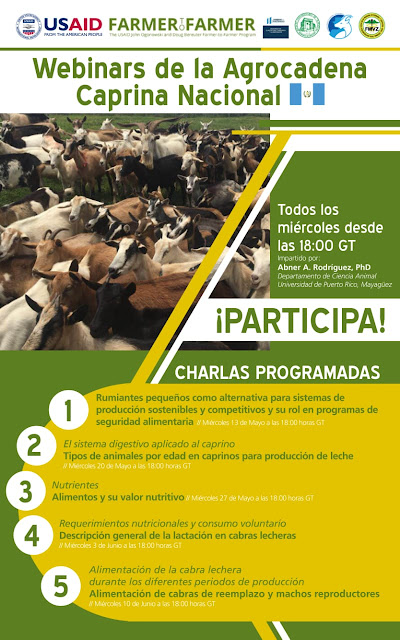Training Goat Producers in Guatemala to Ensure They Are Sustainable and Competitive
The COVID-19 pandemic changed agricultural activities in the whole world and Guatemalan farmers were no exception. Most of them do not have access to technical assistance and training during normal conditions, and this was worsened due to the pandemic, as no national or international technicians or trainers could physically reach rural communities and farms.
The Farmer-to-Farmer (F2F) program in Guatemala implemented a rapid response to this complication. They contacted their partners and host organizations and asked them about their training and assistance needs that could be fulfilled virtually. The F2F team wanted to make sure that they could continue supporting and assisting their hosts remotely, and in this way reduce the impact of the pandemic on their small businesses so that they could continue working to generate employment and provide income in their rural communities.
The F2F program started to implement virtual assignments in May 2020, supporting agribusiness value chains, cooperatives, smallholder farmer associations and agricultural and livestock producers. One of the first remote assignments in Guatemala was with the Agrocadena Caprina Nacional (National Goat Farming Chain or Ovicapri). F2F and Ovicapri teamed up with the Faculty of Veterinary Medicine and Zootechnics of the University of San Carlos de Guatemala, the Ministry of Agriculture, Livestock and Food, and other organizations focused on supporting the sector to carry out open virtual webinars.
The first volunteer recruited for the webinars was Dr. Abner Rodríguez. Dr. Rodriguez has an MSc in Animal Science from the University of Puerto Rico and a PhD in Animal Science from Michigan State University. He is a professor at the Mayagüez Campus of the University of Puerto Rico in the Veterinary Technology program and a returning F2F volunteer who has a variety of distinctions and fellowship awards.
Between May 13th and June 10th, 2020, Dr. Rodriguez hosted five webinars where he trained 85 people. Later, between June and December 2020, local specialists from Ovicapri, the International Goat Association (IGA), the Latin American Association of Specialists in Small Ruminants and South American Camelids (ALEPRyCS), and the University of San Carlos replicated Dr. Rodriguez’ trainings. In total, these experts hosted 17 more webinars where more than 1,500 people were trained on goat production management.
These online seminars were attended not only by people from Guatemala but also from the Dominican Republic, Mexico, El Salvador, Honduras, Argentina, Costa Rica, and Nicaragua. The attendees were very grateful and highlighted the quality of the knowledge shared.
One of the great outcomes of this series of webinars was that the F2F program in Guatemala was asked to co-host the 2021 International Seminar on Goat Production Management with Ovicapri, ALEPRYCS, and IGA. This international conference will be held in the coming months of April and May for the Latin America and Caribbean region. It will focus on food security, rural development and inclusivity, educational programs, and producer organizations, among others.
We will be providing more information about our webinars and the International Seminar in the coming weeks. If you are interested in attending, please make sure to follow us on Instagram and check the ALEPRyCS website frequently.




.png)

Comments
Post a Comment